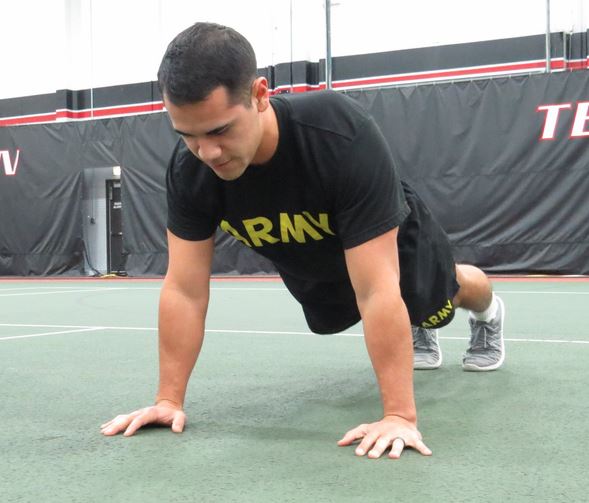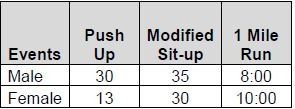In October the Army implemented its new Army Combat Fitness Test (ACFT) which made the prior Army Physical Fitness Test (APFT) obsolete. Besides being the fitness test of record for many years, the APFT was also used as the fitness test to contract college students into Army ROTC. Recently U.S. Army Cadet Command revised its fitness test requirement to reflect the ending of the APFT. The new fitness test is called the Cadet Command Fitness Assessment (CCFA).

All new Cadets who wish to contract will now have to pass the CCFA. The events in this new test include 1-minute of pushups, 1-minute of modified situps, and a 1-mile run. Just like the old APFT the standards to pass the assessment are based on gender. The below chart shows the minimum standards to pass the CCFA:

For retention and commissioning the ACFT will be the test of record for contracted Cadets. Cadets will be required to take an ACFT at least once a semester or quarter. Cadets commissioning will need to complete an ACFT at least 120 days before graduation. Currently no administrative action will be taken against Cadets that fail an ACFT, they just need to complete it. Cadets will be allowed to commission as long as they meet all the other appointment criteria outlined in USACC Regulation 145-9 and CC Form 145-5-1 (USACC Appointment Checklist).
If any Cadets have questioned about the new fitness test requirements feel free to leave a comment or contact your Military Science instructor for more information.


Does this change apply to current cadets?
@Anthony, it depends on whether you are contracted or not. If you are a contracted Cadet then you don’t need to worry about the CCFA, just focus on being able to pass the ACFT. However, if you have not contracted yet you need to pass the CCFA in order to contract into ROTC.
Is there a link to an official document or doctrine that goes further in depth on how the CCFA should be conducted? For example: Is it just a GO/NO-GO? Is there a 5 or 10 minute break before the run just like with the APFT? Thank you in advance.
@Jonathan,
The policy memorandum put out by MG Evans did not go into details about break times between events. We have been giving our Cadets at least five minutes between event. For scoring the memo just had the chart for the minimums you see above that each Cadet must meet to contract. It is a Go/No Go event where they have to reach the minimum for each event to be eligible to contract.
Will the ACFT also be used to contract cadets into the ROTC program when they first arrive on campus?
Right now the Cadet Command Fitness Assessment (CCFA) is used for contracting. Once the ACFT is officially approved at a future date it could change, but the CCFA is what is used at this moment.
How long is this CCFA thing going to last? I have seen so many cadets passed when they can barely run 2 miles
The CCFA will likely last until the ACFT gets officially implemented by the Army.
If you don’t pass will you lose your scholarship?
The CCFA is for Cadets trying to activate a scholarship. If a Cadet does not pass they will have the rest of the academic year to pass. However, the Cadet risks losing money their first semester if they cannot pass the CCFA. If the Cadet passes in the second semester they will get scholarship money for the second semester and not for the first semester. This is why if you are trying to activate a scholarship to take fitness seriously over the summer and come in fit and ready to pass the CCFA. It is not that hard to train for and pass.
how is a modified sit up performed? and are girls allowed to do the push ups with the knees?
Hi Sam,
I am so sorry for the delayed reply I need to correct the email that receives notifications. A modified sit-up is where your hands are behind your head and you sit up until your back is perpendicular to the ground. Females cannot do push-ups from their knees for fitness assessments but initially during physical training while working toward being stronger it can be used to get full range of motion and proper form.
Please feel free to reach out at lmoody1@ewu.edu
Thank you,
Linda